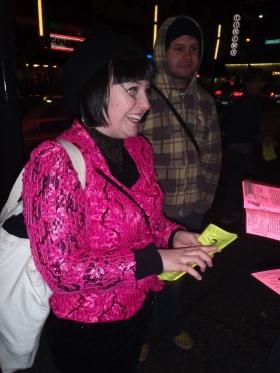Dan Savage was glitter-bombed before his appearance at the Vogue Theatre in Vancouver on Jan 21, the third such action against the high-profile sex columnist and political commentator in recent months.
A group of six activists, who named themselves The Homomilitia for the event, said they confronted Savage as he entered the theatre through a back-alley entrance.
In an interview with Xtra after the confrontation, activist Fister Limp Wrist accused Savage of “ableist, racist, transphobic, fat-phobic, sero-phobic and rape-apologist attitudes and views.” Activists handed audience members bright pink pamphlets outlining their accusations as they entered the theatre.
They are building on the work of trans activists and friends of trans people who glitter-bombed Savage at university appearances in Eugene, Oregon, and Irvine, California, last November. At one event, an activist threw a heavy glass jar at Savage’s face after leaping on stage. Savage managed to duck despite having glitter in his eyes and escaped what one audience member described as “a concussion or worse.”
Queer activists have historically used glitter-bombing as a tactic against conservative politicians and high-profile anti-gay bigots, Vancouver protester Lavender Menace notes. Asked if she lumps Savage in with such people, she says people have different ways of contributing to oppressive systems.
“Savage is taking on being a speaker and leader in this movement. We have to take that into account,” she adds. “He’s part of a broader [group] of gay, white, cis-gendered, able-bodied gay men focused on gay-marriage priorities. We want to say those priorities are messed up.”
Wikipedia notes that glitter-bombing is a tactic of US activists used mainly against people opposing same-sex marriage rights.
Savage has defended himself against the accusations while also speaking out for trans equality on the website of Seattle’s Stranger alt-weekly newspaper, where he works as editorial director.
In response to a written question from the Vancouver audience asking why he’s the subject of denunciation by some trans activists, Savage spoke of the “journey” that society, including himself and other gays, have gone through in the two decades since he started his sex advice column.
Back then, he said, he didn’t have a firm understanding of the nuances of trans issues. And as an activist, he said, he understands the effectiveness of public confrontation with public figures as a means of shining a spotlight on important issues, as ACT UP did on AIDS research funding and public policy.
But, he said, there was an element of opportunism in the glitter-bombings and denunciations that selectively pull quotes from past writings taken out of context. He routinely invites trans people, including Kate Bornstein and Buck Angel, to respond to questions from readers of his column – a breakthrough in educating people, he claimed.
“If I’m an enemy of trans people,” he said, “then [the trans struggle for rights and recognition is] over; it’s lost.”
Understand the difference between your enemies, like Fox News columnists, and your friends, Savage said. “If you have a disagreement with your allies, you discuss it. You don’t attack them,” Savage said to very loud applause from his Vancouver audience. To attack allies over small differences is counterproductive in advancing the agenda, he added.
The pamphlet refers to instances where Savage himself has taken aggressive public stands that go beyond an internal community discussion. A case in point is his campaign in the mid-2000s where he called out AIDS activists that he thought were not aggressive enough in insisting on a condom-only approach to sex. Savage created the impression that “bug chasers” and “givers” were a major trend in the gay community and went so far as to advocate that drug-support payments should be stopped for people who have unsafe sex.
In Vancouver, Savage spoke of his large worldwide audience in print and podcast and his efforts to educate about trans issues to a largely ignorant public. But with the public denunciations, he is reluctant to discuss trans issues, and he knows of other supportive writers and bloggers who are increasingly avoiding discussions out of fear of reprisals from activists.
And that would result in less visibility for trans people and issues, he said.
Audience members interviewed by Xtra clearly sided with the provocative columnist they’d come to hear.
Married couple Kate Mathewson and Kate Seiboth took the pamphlet offered by protesters. “We didn’t read it, though,” says Seiboth, though they scanned it. “But their last point, that he’s not welcome in our city, is not true.”
“We’re here to hear what he has to say,” Mathewson chimes in.
West End gay man Brian Anderson also took the pamphlet and put it away for reading after the event.
“I knew it was going to be negative,” he explains. “And I’d rather not have that around me now. I don’t want it to interfere with the experience. I have a pretty positive view of him. If I put all the positive things I got from his columns and the It Gets Better campaign on one side, and the other politically correct ‘isms’ on the other side, there’s more positive on the Savage side, whatever minor missteps he’s made.”
But Anderson supports the right of activists to vigorously make their point heard. “It’s about free speech,” he says, comparing their right to have a say to that of the “Church Lady” who for years denounced gays and lesbians along the route of the Vancouver Pride parade. The tone of the activists’ pamphlet ironically reminds him of something “put out by my parish of the Catholic Church when I was a kid.”
Gareth Kirkby is a former managing editor of Xtra Vancouver. He is currently director of engagement for Pink Triangle Press, which publishes Xtra.

 Why you can trust Xtra
Why you can trust Xtra


